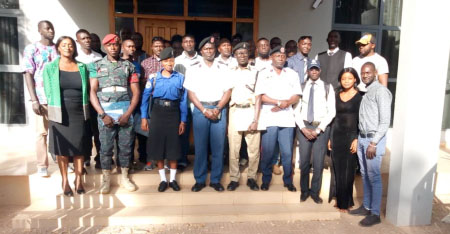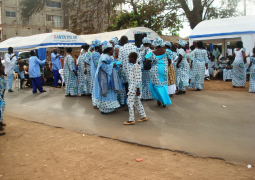
Tulai
Jawara-Ceesay, the director of National Agency Against Trafficking In Persons
(NAATIP) has said that there is no domestic law that criminalises the smuggling
of migrants, saying this gives room for many Gambian girls go to the Middle
East to work as a house girls.
She
made this remark during a daylong sensitisation workshop for law enforcement
officers on Trafficking In Persons at the Ministry of Justice in Banjul on
Monday.
She
said NAATIP is not mandated to work on migration issues, citing the Ministry of
the Interior as the focal point under the Migration Unit Act at the Department
of Immigration.
NAATIP
director added that trafficking in persons and migration are cross cutting
issues and recalling that The Gambia had signed to rectify the Palermo Protocol
designed to prevent suppression and punish those involved in the trafficking in
persons especially children and women.
She
added that the Palermo Protocol has captured issues of smuggling of migrants,
trafficking in persons and smuggling of small arms.
Mrs.
Jawara Ceesay pointed out that smuggling of migrants through the ‘backway’ is a
crime difficult to stop or punish, arguing that there is no domestic law that
criminalises the menace. She was, however, quick to note that there is
migration policy and also draft smuggling of migrants legislation, which in the
near future will be able to punish the intermediaries.
According
to her, NAATIP has investigated cases including four other cases that are
ongoing at the court. Among these cases, she said, is sexually exploitation
case.
She
enlightened that there is Trafficking In Persons Act in which the government is
working on in order to prosecute the trafficking suspects.
Mansour
Jobe, senior legal officer, National Human Rights Commission (NHRC), said that
the training was very important as it will remind officers about their roles
and responsibilities in the fight against trafficking in persons which he
described as a serious problem in The Gambia.
He pointed that despite the agency’s
responsibility to combat trafficking in persons, they also need the support
from the law enforcement officers because they also play a very vital role in
the crusade.
Mr.
Jobe echoed that The Gambia is yet to have the smuggling of migrants law in the
country, citing it as one of the requirements of the Convention Against
Transnational Crimes. “I hope that the government will come up with the
legislation that will supplement the effort of trafficking act in order to deal
with the issues particularly irregular migration.
Omar
Cham, a participant, encouraged his fellow participants to make best use of
knowledge and skills gained from the training by putting them into practice at
their various workplaces so that issue of trafficking in persons can be a thing
of the past in The Gambia.



